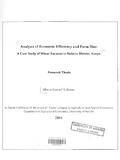| dc.description.abstract | The wheat sector in Kenya has been facing several challenges among them declining yields and
while self-sufficiency in wheat remains a stated goal of the government, it has remained elusive
over the years. The primary objective of this study is to examine the effect of farm size on
economic efficiency among wheat producers and to suggest ways to improve wheat production
in the country. Specifically the study attempts to estimate the levels of technical, allocative and
economic efficiencies among the sampled 130 large and small scale wheat producers in Nakuru
District. The social-economic factors that influence economic efficiency in wheat production
have also been determined.
This study uses the parametric stochastic efficiency technique that follows the Kopp and Diewert
(1982) cost decomposition procedure to estimate technical, allocative and economic efficiencies.
Its advantage lies in the application of a stochastic frontier model with a disturbance term
specification that captures noise, measurement error and exogenous shocks beyond the farm. The
two-step regression model has been used to analyze the effects of the social-economic factors on
economic efficiency using a censored tobit model. Results indicate that the mean technical,
allocative and economic efficiency indices of small-scale wheat farmers are 85%, 96% and 84%
respectively while for the large-scale farmers the mean technical, allocative and economic
efficiency indices are 91%, 94% and 88%. Thus the results from both small and large scale
farmers reveal some considerable levels of inefficiencies in wheat production in Nakuru District.
The number of years of school the farmer has had in formal education, distance to extension
advice and the size of the farm have strong influence on the efficiency levels. The relatively high
levels of technical efficiencies among the small scale farmers defies the notion that wheat
production in Kenya can only be efficiently produced by the large scale farmers. This study
shows that it is possible for small-scale farmers to produce wheat efficiently.
The study recommends that to improve the farmer knowledge and skills there is need for public-private
partnerships in the provision of extension services. Reduction in the cost on fuel and
spare parts for farm machinery through reduction of taxes and tariffs is critical in increasing
wheat production. In the medium/ ·long term there is need to invest in simple technology
machineries to be used especially by the small scale wheat farmers. | en |

